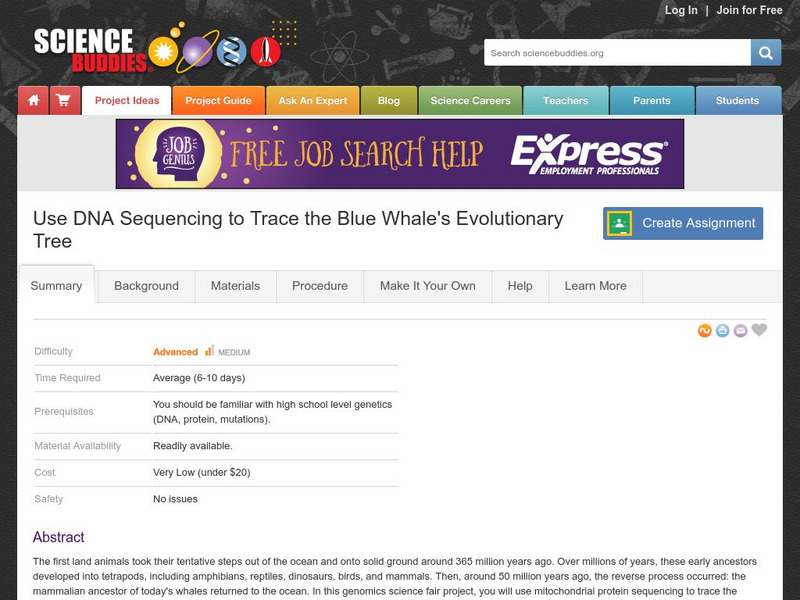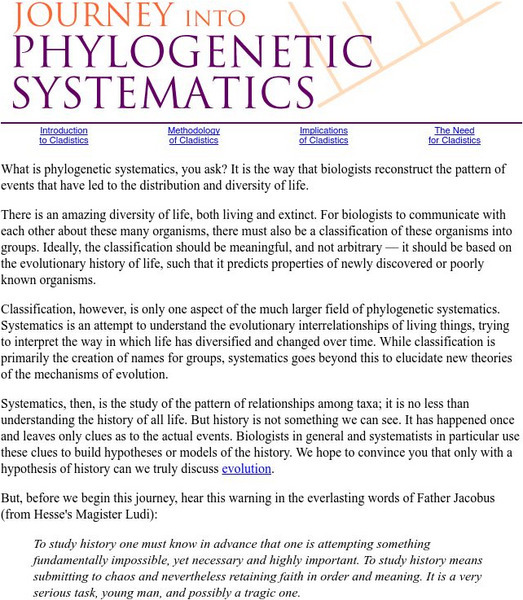Howard Hughes Medical Institute
Using DNA to Explore Lizard Phylogeny
In a fun and interactive two-day lesson, learners sort anole lizard pictures by appearance. Next, they watch a video about the anoles and re-sort based on the information in the video. In addition to physical characteristics, budding...
Curated OER
Relationships and Biodiversity Lab Practice
In this biodiversity worksheet, students determine the relationship and complete the evolutionary tree for the plants listed. Students review genetic code and DNA sequencing. This worksheet has 1 graphic organizer, 8 multiple choice, and...
Science Buddies
Science Buddies: Use Dna Sequencing to Trace the Blue Whale's Evolutionary Tree
Around 50 million years ago, the mammalian ancestor of today's whales returned to the ocean. In this genomics science fair project, you will use mitochondrial protein sequencing to trace the evolution of whales and identify their closest...
Indiana University
Ensi: Introduction to Evolution Lesson Plan
This unit plan presented by the Evolution and the Nature of Science Institutes is one way to introduce evolution. The authors have created a Pre-test about what evolution is/is not to address misconceptions. There are handouts and...
Biology Corner
Biology Corner: Fossil Record
In this lesson plan, learners use the fossil record to understand the topics of speciation, punctuated equilibrium, and gradualism. Students arrange fictitious animals' fossils by age based on appearance to create a fossil record.
University of California
Ucmp: Phylogenetic Systematics: Evolutionary Trees
This page provides an introduction to phylogenetic systematics, the way that biologists reconstruct the pattern of events that have led to the distribution and diversity of life. A tutorial "journey" into the Introduction, Methodology,...
McGraw Hill
Glencoe Biology: Primate Evolution: Standardized Test Practice
Fifteen multiple choice questions over primate evolution. After the quiz, the self-checking feature allows students to see which were the correct answers.
PBS
Pbs: Intimate Strangers: Tree of Life
Find out how Dr. Carl Woese used RNA to develop the tree of life.
National Health Museum
Nhm: Amino Acid Sequences Show Evolution
This lesson plan focuses on differences in the amino acid sequence of hemoglobin and myoglobin proteins. They use the number of differences to create a phylogenetic tree.
National Health Museum
Access Excellence: Molecular Biology/primate Phylogeny
This lesson plan involves comparison of amino acids to create a phylogenetic tree of primates. Students will also use other species information to draw conclusions about evolutionary relationships.
Famous Scientists
Famous Scientists: Ernst Haeckel
Find out about Ernst Haeckel, a scientist known for his work with ecology, zoology, and the study of phylogeny.
CK-12 Foundation
Ck 12: Life Science: Tracing Evolution
[Free Registration/Login may be required to access all resource tools.] How fast is evolution? Can you actually see evolution happening within your lifetime? Usually evolution takes a long time. So how can we visualize how it has...
Annenberg Foundation
Annenberg Learner: Evolution of Tungara Frog Mating Calls
Use molecular information and observe female response patterns to learn about the mating calls of Physalaemus frogs. Examine the evolution of female preference for particular call characteristics.










